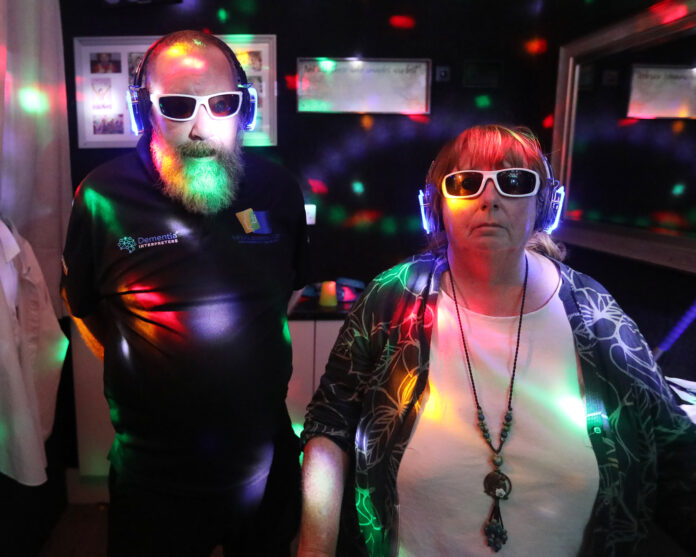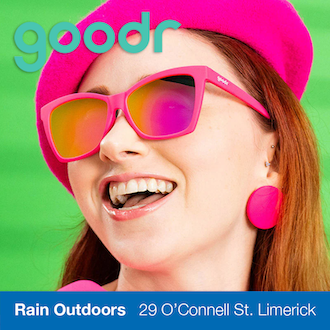
TO AN outsider, it looks like a room all set up for a disco complete with strobe lights. But behind the goggles, headphones, and de-sensitising gloves and insoles this reporter was decked out in, the simulated experience of what it’s like to have dementia is horrific, writes Bernie English.
The moving dots of light, the blurred vision, and the unfamiliarity of the dark room around me have induced a vertigo that leaves me terrified to take a step in case I fall. I have no depth perception, which is making me nauseous, and what are probably familiar domestic objects take on bizarre shapes.
And that’s nothing to the noise. Deafening, unintelligible babble with sounds that my brain interprets as manic laughter, accusatory shouting, and cars and heavy vehicles whizzing by my ears.
I feel as if I’m trapped with my head sticking out of a hole in the road in the middle of Fifth Avenue and any minute now a yellow taxi I can’t see coming will decapitate me.
I feel paranoid, terrified, dizzy, and sick and now a voice tells me “do something useful”. I try. There’s something under my hand that might be bedclothes, so I try to push it around a bit, but if I was asked to make the bed neat, I couldn’t do it to save my life. Suddenly I can’t move because there’s pain shooting up through my feet as I feel like I have sharp gravel in my shoes.
I’m handed a piece of paper and a pen and told “write a report for your paper” by a voice that cuts through the cacophony of noise. I drop it twice before I manage to hold it.
I can barely make out the parameters of the page. When I do scrawl one word, it takes up the whole page. Examining it later on, it looks nothing like my handwriting.
Then a siren starts screaming in my ears and I just want it all to end.
The entire experience lasted just three minutes. I, for one, don’t think I could have endured it a minute longer. But, I’m told, by the time someone has reached this stage with dementia, they are powerless to make it stop.
For people with mid-stage dementia, this goes on and on, even when they’re asleep, my host, John Sanders, a man with 30 years’ experience in caring for people with dementia and mental illness tells me.
“One in three people will develop some form of dementia,” he says. “They experience what you have just been through every day and more besides, but there is a lot that can be done to make their lives better.”
John is facilitator for the Virtual Dementia Tour, on which Bluebird Care have teamed up with Dunnes Stores for Alzheimer’s Awareness Month to bring an eye-opening experience to communities across the country.
“Understanding the condition can help people to support those who have it,” John tells me of the motion of the tour.
“The room you were in was dark and full of objects you weren’t familiar with … It helps to declutter and simplify a space and make the person familiar with where things are. It’s why people with dementia generally do much better at home in their own environment”.
But if it’s possible to stay in that environment, it needs to be made safe.
“You need fireguards,” John explains. “People who lose sensation through dementia have been known to suffer third degree burns without feeling any pain. You have to guard against them wandering off to do something that was once familiar and then becoming even more confused because they have no idea where they are”.
“A person with dementia will eat far more off a red plate than a white one – why? Because they can’t see mashed potato on a white plate. They can’t see if there’s bottle or a pitcher of water on the table if it’s clear glass or plastic. But no one thinks to ask why they’re not drinking it.”
Suzanne Ryan, managing director of Bluebird Care Ireland, told this reporter that there are currently 55,000 diagnoses of dementia in Ireland, with the rate is expected to go up by 11,000 each year.
“And that’s just the people who have been diagnosed,” she adds.
Suzanne says that understanding the brain fog and overwhelming sensations is important for people trying to help loved ones or friends experiencing dementia.
“That’s why we have made the virtual experience available to all of our carers, to foster understanding and empathy and make it easier for them to support and help clients.”
“Now, in collaboration with Dunnes Stores, we’re bringing the experience to the community.”
Medicine can pinpoint no one cause for the condition, in which the brain deteriorates and dies. Suzanne is not proposing any ideas on that, but what she does know is that the more caregivers – and the wider community – understand the condition, the more likely they are to try to help.
Details, dates, and further information about the virtual reality experience are available on bluebirdcare.ie.


